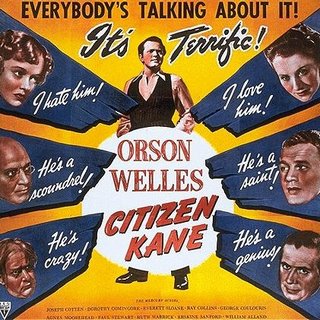
While working on the entry for A Letter To Three Wives earlier this week, the Head of Reference Evelyn Gibbons asked me, "Did you know that Citizen Kane was inspired by a bike stolen from the front of Osterhout Library?" My first thought was, "How can this possibly be true?" So she told me to the call the Reference Department at Osterhout Free Library to confirm this and, sure enough, they faxed me an article that proved this, indeed, was a fact (not that I didn't believe Evelyn, of course, but this reference is truly remarkable). But can you believe that Citizen Kane, considered by many to be the greatest American film ever made, was inspired by a true incident in Wilkes-Barre, PA?
The Oscar-winning screenplay for Citizen Kane was written by Herman Mankiewicz, brother of Joseph L. Mankiewicz--Joseph often worked the city of Wilkes-Barre (his birthplace and hometown) into his scripts, two of which (All About Eve and A Letter To Three Wives) won back-to-back Oscars for Best Screenplay in 1949 and 1950. Although Joseph's brother Herman was born in New York City in 1897, he lived in Wilkes-Barre for nine years as a boy.
The article, "Listen Up, Cinema Sleuths: Rosebud Was Really A Bike" by Times Leader Staff Writer Joe Butkiewicz, was originally published on May 1, 1991. In the article, Butkiewicz referenced a biography of Herman Mankiewicz by Richard Merryman titled, Mank: The Wit, World and Life of Herman Mankiewicz.
According to the article and the biography, Herman received a bicycle for Christmas at the age of 10. One day, Herman went to the local public library (the name of the library is not mentioned, but the assumption is the library was the Osterhout in Wilkes-Barre) and parked his bicycle outside--when he left the library some time later, "Rosebud"was missing and presumed stolen. As punishment, Herman's parents never replaced his lost/stolen bicycle, instead telling him the incident was his own fault.
Co-written by, directed by, and starring Orson Welles, Citizen Kane tells the story of the death of publishing tycoon Charles Foster Kane and the ensuing search by news reporters to discover the meaning of his final utterance--"Rosebud."
SPOILER ALERT
In the film, "Rosebud" was the name of the sled Kane had as a young boy and represented the happiest time of his life--his childhood.
In real life, "Rosebud" was the nickname of the bike Herman Mankiewicz had as a young boy that his parents refused to replace when it was stolen from the front of a public library in Wilkes-Barre, PA. In turn, this incident of childhood loss inspired a masterpiece that will live on for generations.
END OF SPOILER ALERT
A copy of the Times Leader article "Listen Up, Cinema Sleuths: Rosebud Was Really A Bike" by Joe Butkiewicz is available in the "Movies" Local History Vertical File in the Reference Department.
Citizen Kane is available to borrow from the Lackawanna County Library System on both DVD and VHS. Click on the corresponding format you'd like to place a hold.
My deepest thanks to both Evelyn Gibbons and the Reference Staff at the Osterhout Free Library for this reference.